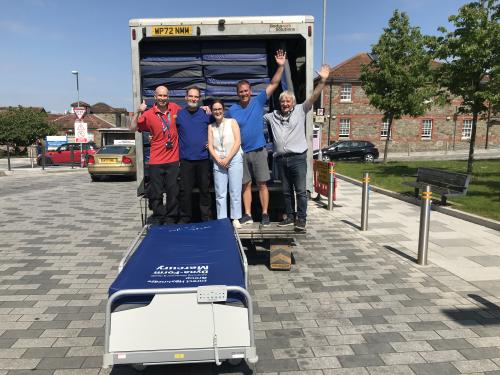
North Bristol NHS Trust has been donating mattresses to hospitals in Ukraine, Congo and Zimbabwe, as well as to local community organisations.
The foam mattresses are no longer required by the Trust because they have been replaced by brand-new hybrid dynamic mattresses in wards across Southmead Hospital. The hybrid mattresses are gradually being rolled out across NBT wards, and will contribute to a more comfortable experience for patients. Usually, the foam mattresses would be collected and incinerated – a costly process that contributes to NBT’s total carbon footprint. But a new joint initiative spearheaded by a few determined staff members means these mattresses can go to communities that really need them.
So far, around 340 foam mattresses have been sent overseas. This equates to saving approximately 18 tonnes of CO2 – the equivalent of flying from Bristol to Sydney seven times.
The project has been brought to life by staff from Infection Control, Tissue Viability, the Beds and Mattresses team and Sustainability.
“We've managed to donate to lots of different kind of causes, we've sent them to Ukraine, to the military hospitals there. They've gone to the Congo, to the community hospitals and Zimbabwe in some community hospitals there as well. I think people there originally had no mattresses at all, so that's a huge benefit to them,” said Sarah Wheatley, Head of Infection Control and Tissue Viability. Sarah was one of the key people driving the change.
Together with Kim Whitlock from Tissue Viability and Megan Murphy, Sustainability Manager, they worked out the logistics and came up with a process to send the mattresses overseas whilst still adhering to Trust guidelines around disposing of clinical waste.
Sarah admits it would have been less effort to follow the existing process, but they were prepared to take on the extra work to create a more sustainable way of doing things.
“In Infection Control we're seen as being very single-use - use it once, throw it away. We need to flip that narrative as a Trust, we need to make reusing easier for people.”
The treatment of waste makes up 1% of NBT’s total carbon footprint – this may not sound like much, but it’s the equivalent of burning 300 tonnes of coal each year. There are also costs associated with incineration, which adds up for a hospital with hundreds of mattresses to dispose of. Managing waste more sustainably is crucial to achieving the NHS’s Net Zero Carbon by 2030 goal.
This is a key consideration for Megan in her role as the Trust’s Sustainability Manager – examining existing practices within the Trust and considering ways they can be more sustainable.
“By reusing these mattresses, we're also aligning ourselves with the clinical waste strategy for the whole NHS as well, which is trying to reduce our waste and reuse things,” said Megan.
“This is basically best practice. This is what we should be doing each time we're doing these types of projects.”
As well as its sustainability benefits, the project also helped strengthen the Trust’s ties with the wider community.
“When we reached out to different organisations to see if they wanted the mattresses …the demand was way more than the mattresses we could provide. It was showing us what a waste it would have been if we just threw all the mattresses away because they were definitely needed elsewhere. Just simply asking that question and all the partnerships that we've now made through donating these mattresses has been quite impactful,” she said.
Aggie Dimunge from the Beds and Mattresses team said:
“We were initially concerned about the logistical and cost implication of disposing of 600 mattresses, so we're really pleased to see how well it worked and glad to be part of the implementation. There are definite lessons for the team to take forward with other large medical device replacement projects."
Although the initiative was planned as a one-off, everyone is keen to build on the lessons they learnt.
Both Sarah and Megan are part of the Infection Prevention Society (IPS), an industry network of healthcare professionals across the UK. They plan to present their ideas and findings from the mattress project at the IPS’s national conference later this year.
“I think this is very much born from people's passion to do something,” Sarah said.
“In NBT, everyone's got quite a drive to do things differently, and to think and be curious, and I think this absolutely demonstrates that.”
